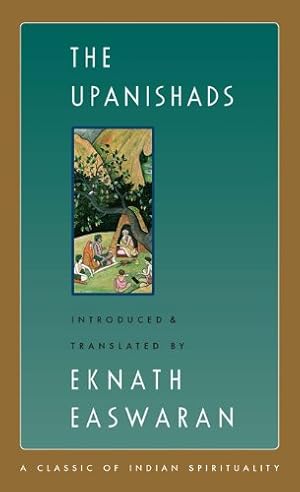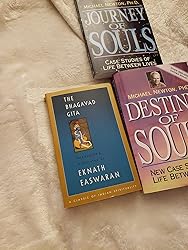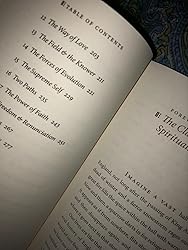| Digital List Price: | $10.99 |
| Kindle Price: | $7.99 Save $3.00 (27%) |
| Sold by: | Amazon.com Services LLC |
Your Memberships & Subscriptions

Download the free Kindle app and start reading Kindle books instantly on your smartphone, tablet, or computer - no Kindle device required.
Read instantly on your browser with Kindle for Web.
Using your mobile phone camera - scan the code below and download the Kindle app.

OK
 Audible sample Sample
Audible sample Sample 


The Bhagavad Gita (Easwaran's Classics of Indian Spirituality Book 1) Kindle Edition
The Bhagavad Gita is the best known of all the Indian scriptures, and Eknath Easwaran’s best-selling translation is reliable, readable, and profound.
Easwaran's 55-page introduction places the Bhagavad Gita in its historical setting, and brings out the universality and timelessness of its teachings. Chapter introductions clarify key concepts, and notes and a glossary explain Sanskrit terms.
Easwaran grew up in the Hindu tradition in India, and learned Sanskrit from a young age. He was a professor of English literature before coming to the West on a Fulbright scholarship. A gifted teacher, he is recognized as an authority on the Indian classics and world mysticism.
The Bhagavad Gita opens, dramatically, on a battlefield, as the warrior Arjuna turns in anguish to his spiritual guide, Sri Krishna, for answers to the fundamental questions of life. Yet, as Easwaran points out, the Gita is not what it seems – it’s not a dialogue between two mythical figures at the dawn of Indian history. “The battlefield is a perfect backdrop, but the Gita’s subject is the war within, the struggle for self-mastery that every human being must wage if he or she is to emerge from life victorious.”
Arjuna’s struggle in the Bhagavad Gita is acutely modern. He has lost his way on the battlefield of life and turns to find the path again by asking direct, uncompromising questions of his spiritual guide, Sri Krishna, the Lord himself. Krishna replies in 700 verses of sublime instruction on living and dying, loving and working, and the nature of the soul.
Easwaran shows the Gita’s relevance to us today as we strive, like Arjuna, to do what is right.
“No one in modern times is more qualified – no, make that ‘as qualified’ – to translate the epochal Classics of Indian Spirituality than Eknath Easwaran. And the reason is clear. It is impossible to get to the heart of those classics unless you live them, and he did live them. My admiration of the man and his works is boundless.”– Huston Smith, author The World’s Religions
Updated to be more accessible to readers with vision impairment (July, 2022)
- LanguageEnglish
- PublisherNilgiri Press
- Publication dateJune 1, 2009
- File size1377 KB
 On a larger scale, dharma means the essential order of things, an integrity and harmony in the universe and the affairs of life that cannot be disturbed without courting chaos. Thus it means rightness, justice, goodness, purpose rather than chance.Highlighted by 5,513 Kindle readers
On a larger scale, dharma means the essential order of things, an integrity and harmony in the universe and the affairs of life that cannot be disturbed without courting chaos. Thus it means rightness, justice, goodness, purpose rather than chance.Highlighted by 5,513 Kindle readers The word dharma means many things, but its underlying sense is “that which supports,” from the root dhri, to support, hold up, or bear. Generally, dharma implies support from within: the essence of a thing, its virtue, that which makes it what it is.Highlighted by 4,477 Kindle readers
The word dharma means many things, but its underlying sense is “that which supports,” from the root dhri, to support, hold up, or bear. Generally, dharma implies support from within: the essence of a thing, its virtue, that which makes it what it is.Highlighted by 4,477 Kindle readers
From the Publisher
|
|
|
|
|---|---|---|
|
|
|
|

Editorial Reviews
Review
“No one in modern times is more qualified — no, make that ‘as qualified’ — to translate the epochal Classics of Indian Spirituality than Eknath Easwaran. And the reason is clear. It is impossible to get to the heart of those classics unless you live them, and he did live them. My admiration of the man and his works is boundless.”
— Huston Smith, author of The World’s Religions
"The translation...is smooth, eloquent, and reliable...[I] would unhesitatingly recommend Easwaran to someone searching for the spirituality of the Gita." — Choice [1st edition]From the Back Cover
About the Author
Product details
- ASIN : B004DI7R5G
- Publisher : Nilgiri Press; 2nd edition (June 1, 2009)
- Publication date : June 1, 2009
- Language : English
- File size : 1377 KB
- Text-to-Speech : Enabled
- Screen Reader : Supported
- Enhanced typesetting : Enabled
- X-Ray : Not Enabled
- Word Wise : Enabled
- Sticky notes : On Kindle Scribe
- Print length : 264 pages
- Best Sellers Rank: #53,319 in Kindle Store (See Top 100 in Kindle Store)
- #1 in Bhagavad Gita (Kindle Store)
- #1 in Gandhi
- #2 in Hindu Theology (Books)
- Customer Reviews:
About the author

Eknath Easwaran (1910-1999) is one of the twentieth century's great spiritual teachers and an authentic guide to timeless wisdom.
He is a recognized authority on the Indian spiritual classics. His translations of the Bhagavad Gita, the Upanishads, and the Dhammapada are the best-selling editions in the USA.
His books on meditation, spiritual living, and the classics of world mysticism have been translated into sixteen languages. His book Passage Meditation (originally titled Meditation) has sold over 200,000 copies since it was first published in 1978. Two million copies of Easwaran's books are in print.
* Sign up for the free daily Thought for the Day, our bi-weekly email with short articles and stories, and/or our twice-yearly Journal at www.bmcm.org/subscribe/.
* For more information on Eknath Easwaran and free resources on meditation and spiritual living, please visit www.bmcm.org.
Born in Kerala, India, Easwaran was a professor of English literature at a leading Indian university when he came to the United States in 1959 on the Fulbright exchange program. A gifted teacher, he moved from education for degrees to education for living, and gave talks on meditation and spiritual living for 40 years. His meditation class at UC Berkeley in 1968 was the first accredited course on meditation at any major university.
In 1961 he founded the Blue Mountain Center of Meditation, a nonprofit organization that publishes his books, videos, and audio talks, and offers retreats and online programs.
Easwaran lived what he taught, giving him lasting appeal as a spiritual teacher and author of deep insight and warmth.
Discovering Meditation
Easwaran discovered meditation mid-life, while he was teaching on a college campus in central India. In the midst of a successful career he found himself haunted by age-old questions: Why am I here? What is life for? What will happen when I die?
Meanwhile in a few short months he lost two people passionately dear to him: Mahatma Gandhi, whom he’d visited in his ashram, and his beloved grandmother, who was his spiritual teacher. Finally he came home one day to find his dog had been killed by a passing truck, and his sense of loss would not subside. His dog stood for death itself, for all who had passed away.
“Almost instinctively,” Easwaran said, “I went to my room and picked up my Gita, most of which I knew by heart. I closed my eyes, and as I began to repeat the verses silently to myself, the words opened up and took me deep, deep in.” Over the next weeks he continued in the same way, seated in silence in the early morning. His meditation practice had begun.
Still leading a full life at the university, Easwaran looked for guidance in this new inner world. He read the Upanishads, Patanjali, the Catholic mystics, the Buddhist scriptures, the poetry of the Sufis. In addition to his Bhagavad Gita, he found passages for meditation from every major spiritual tradition. Some of the mystics he studied had chosen not to retire into monasteries but, like himself, to seek the spiritual path in the midst of everyday life.
In meditation, he found a deep connection between the wisdom in the passages and the way he conducted himself throughout the day. It was a thrilling discovery. “The passages were lifelines, guiding me to the source of wisdom deep within and then guiding me back into daily life.”
Years passed, and Easwaran’s inner and outer life became richer and more challenging as his meditation deepened.
In 1959 he came to the US on the Fulbright scholarship and lectured widely on the spiritual heritage of India. Some students were eager to learn about meditation, and Easwaran loved teaching. He developed a simple, effective eight-point program of passage meditation based on his own spiritual experience. Thousands of people of all ages and backgrounds now follow this program all around the world.
Easwaran as a Teacher
In the introduction to one of his key books, Easwaran described his approach as a teacher. He appealed to people, he said, “partly because I have not retired from the world – I live very much as a family man, a good husband, son, and friend – but also because I have tried to combine the best of West and East.
“I live together with forty friends at our ashram, or spiritual community, and though I have heavy responsibilities in guiding our work, I take time for recreation. I go with friends to the theater; I am fond of Western and Indian classical music; I like to take the children to the ice cream parlor and the dogs to the beach for a run.
“But perhaps what appeals most deeply is that I understand the difficulties of living in the modern world. Before taking to meditation, in my ignorance of the unity of life, I too committed most of the mistakes that even sensitive people commit today. As a result, I understand how easy it is to make those mistakes, and I know how to guide and support those who are trying to learn a wiser way of living.”
Easwaran Now
Since Easwaran’s passing in 1999, interest in his work has only increased. People choose to relate to him today in various ways: as an authority on world mysticism; as a wise spiritual writer; as an experienced teacher of meditation; and as a personal spiritual guide.
The meditation programs that Easwaran created for every stage of life are reaching growing audiences in person and online. He left a vast legacy of video and audio talks which will be shared increasingly over the next years through our website, programs, publications, and digital library.
For those who seek him as a personal spiritual guide, Easwaran assured us that he lives on through his eight-point program.
"I am with you always”, he said. “It does not require my physical presence; it requires your open heart."
Customer reviews
Customer Reviews, including Product Star Ratings help customers to learn more about the product and decide whether it is the right product for them.
To calculate the overall star rating and percentage breakdown by star, we don’t use a simple average. Instead, our system considers things like how recent a review is and if the reviewer bought the item on Amazon. It also analyzed reviews to verify trustworthiness.
Learn more how customers reviews work on AmazonReviews with images
-
Top reviews
Top reviews from the United States
There was a problem filtering reviews right now. Please try again later.
This author and publisher does a really great job at making their books very readable and easy to manage. I have the Upanishads by the same publisher/author and it is of the same print/design.
Easwaran’s translation is very easy to understand. It tells the story of Arjuna, a prince stuck between two armies, not wanting to fight because he doesn’t understand what the good of killing others would be. This is a very honest question, and over the 18 chapters, he gets his answer from Krishna, (one form of Vishnu, one of the holy trinity), who happens to be serving as his charioteer in the war. Krishna is loving and gives Arjuna all the information he needs about life and death, and about his responsibilities as a warrior.
To be completely honest, I don’t know how to write a review for The Bhagavad Gita. My best advice would be to simply do a search for ‘Bhagavad Gita quotes’ and see if you like what you read. For anyone wondering if this book is only for “religious people”, I don’t think so. It’s explained several times in the introduction that the Gita can be seen as a book to help people through life, a kind of guide book. It never tells you what you’re supposed to be doing, or how you’re supposed to act. It simply tells you, in the same way a good friend might give you advice while trying to be nice about it, how to improve.
This version also has introductions before each chapter. At first, I would read a chapter, then the introduction, but after the fifth or sixth, I started with the introductions. Some have mentioned that the introductions are a little intrusive, or reiterate things you’re already going to be reading about. Personally, I found them to be very helpful. Some terms that just plain couldn’t be translated into English, are broken down in these introductions, making it a lot easier to read the chapter without going “wait, what does that mean?” and having to look it up or keep skipping to the glossary. There is also a lengthy introduction at the beginning of the book, further explaining certain Hindu ideas and terms, and even going over some very interesting history. Even some things I though I fully understood, like renunciation, are explained more here than they are in the individual chapter intros, and I appreciated it. Basically, this is as complete as you could probably get if you wanted a copy of the Bhagavad Gita with a little more than the Gita itself.
Again, it was hard to sit here and type up anything for this book. If I could, I’d just type up a couple of my favorite verses…but that may be several pages of material that you can easily find elsewhere. You know what’s funny? I’ve memorized many Indian words while reading the Gita, and even after just reading it once, I’ve memorized what chapters some of my favorite verses come from. I’d sit there and ask myself, “what chapter was [x verse] in again?”, then I’d flip right to it, almost always on the exact page the verse was on.
The Bhagavad Gita is one of those books that I can honestly say I got something out of while, and after, reading it. Look up some quotes, and if anything sticks, get the book. It’s very inexpensive and full of good advice.
I do, however, read this along with two other translations, both of which include the Sanskrit, as I find having those terms alongside the English to be indispensable when trying to incorporate more deeply into the tradition and learn a new language. So that's just something that helps me and that others might want to invest in, as well.
Top reviews from other countries
1. Simple english
2. Excellent binding
3. Explanation of terms used in Bhagavadgeetha in the introduction - this helped me a lot
4. Brief introduction to each chapter at the beginning of each chapter - this gives overview and context for the chapter
5. Excellent binding
Cons:
None I could think of
Note: this book is for someone who never read Bhagavadgeetha. So, everything is straightforward without any deeper explanation. Having said that Bhagavadgeetha itself is insightful and full of wisdom. So, you will benefit reading this book for sure.
Reviewed in India on July 24, 2022
1. Simple english
2. Excellent binding
3. Explanation of terms used in Bhagavadgeetha in the introduction - this helped me a lot
4. Brief introduction to each chapter at the beginning of each chapter - this gives overview and context for the chapter
5. Excellent binding
Cons:
None I could think of
Note: this book is for someone who never read Bhagavadgeetha. So, everything is straightforward without any deeper explanation. Having said that Bhagavadgeetha itself is insightful and full of wisdom. So, you will benefit reading this book for sure.






























